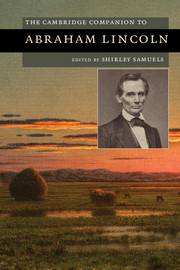Book contents
- Frontmatter
- Introduction
- 1 Rhetorically Lincoln: Abraham Lincoln and Oratorical Culture
- 2 Abraham Lincoln and Poetry
- 3 Seeing Lincoln: Visual Encounters
- 4 Lincoln's Gettysburg Address and Second Inaugural Address
- 5 Lincoln and the Natural Nation
- 6 Abraham Lincoln and the American Indians
- 7 Abraham Lincoln and the Self-Governing Constitution
- 8 Abraham Lincoln and Spiritual Crisis
- 9 America and Britain during the Civil War
- 10 Lincoln in International Memory
- 11 Lincoln's Hemispheric Relations
- 12 Lincoln on Hallowed Ground
- Guide to Further Reading
- Index
8 - Abraham Lincoln and Spiritual Crisis
Published online by Cambridge University Press: 28 September 2012
- Frontmatter
- Introduction
- 1 Rhetorically Lincoln: Abraham Lincoln and Oratorical Culture
- 2 Abraham Lincoln and Poetry
- 3 Seeing Lincoln: Visual Encounters
- 4 Lincoln's Gettysburg Address and Second Inaugural Address
- 5 Lincoln and the Natural Nation
- 6 Abraham Lincoln and the American Indians
- 7 Abraham Lincoln and the Self-Governing Constitution
- 8 Abraham Lincoln and Spiritual Crisis
- 9 America and Britain during the Civil War
- 10 Lincoln in International Memory
- 11 Lincoln's Hemispheric Relations
- 12 Lincoln on Hallowed Ground
- Guide to Further Reading
- Index
Summary
On December 13, 1862, thousands of Union troops were ordered to cross a temporary bridge over the Rappahannock River and into the town of Fredericksburg, Virginia. Almost 13,000 soldiers died in that slaughter, which many observers considered a suicide mission. George Whitman was injured at Fredericksburg and stated that the battle “was lost in my opinion solely through incompetent generalship”; his brother Walt called it “the most complete piece of mismanagement perhaps ever yet known in the earth's wars.” Oliver Wendell Holmes, later to become Justice of the United States Supreme Court, was a soldier in a regiment that lost forty-eight men at Fredericksburg: “I firmly believe … that the men who ordered the crossing of the river are responsible to God for murder.” Those orders, believed Holmes, came from a deranged form of certainty on which the entire war was premised. As one historian has argued, “The lesson Holmes took from the war can be put in a sentence. It is that certitude leads to violence.” Late in his life, Holmes wrote to a friend, “I detest a man who knows that he knows.” The “highly cultivated, homogeneous” world in which he had been raised had been efficiently destroyed by the events of the war. Certainty breeds violence – and so certainty must be abandoned.
Disasters like the Battle of Fredericksburg, undertaken in the name of God and country, caused participants and observers alike to question their deeply held convictions about the nature of the conflict. These growing metaphysical doubts appear here as symptomatic of and contributing to a larger spiritual crisis that rocked the American evangelical world of the period. This crisis simultaneously marked the life of Abraham Lincoln and informed the rapid mythologizing of his memory in the aftermath of the assassination. Much of Lincoln’s greatness as a leader and visionary was linked to his uncanny ability, not only to navigate the treacherous waters dividing the Union and the Confederacy, but also to navigate those dividing the warring factions of the spiritual realm.
- Type
- Chapter
- Information
- The Cambridge Companion to Abraham Lincoln , pp. 126 - 140Publisher: Cambridge University PressPrint publication year: 2012

